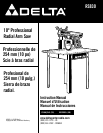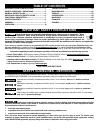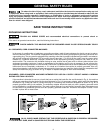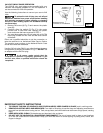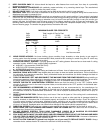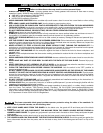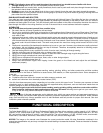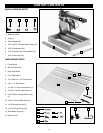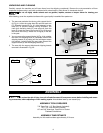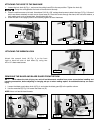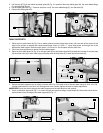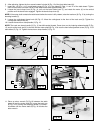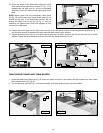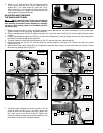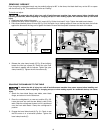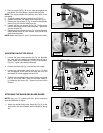
6
The lower retractable blade guard provides operator protection along the sides of the sawblade. To
reduce the risk of potential hazards, use the following rules:
a, KEEP YOUR HANDS AWAY FROM THE GUARD. As the blade cuts, the guard will lift and leave part of the blade
exposed.
b. TURN THE UNIT OFF AND DISCONNECT THE MACHINE FROM THE POWER SOURCE BEFORE FREEING A
JAMMED LOWER GUARD. The guard can get jammed in previous kerfs in the table or fence. Always anticipate the path
of the guard.
c. USE CAUTION when making bevel cuts to be sure that the lower guard is never pinched toward the blade.
d. THE LOWER GUARD CAN JAM AGAINST THE FENCE DURING NARROW IN-RIPS. Should the guard jam against the
fence, disconnect the saw from the power, wait for the blade to stop, then lift the blade guard and rest it on top of the
fence.
1. ALWAYS USE SAFETY GLASSES. Everyday glasses are NOT safety glasses. Also use face or dust mask if cutting
operation is dusty. ALWAYS wear certified safety equipment:
l ANSI A87.1 eye protection (CAN/CSA Z94.3)
l ANSI S12.6 (S3.19) hearing protection
l NIOSH/OSHA respiratory protection
2. AVOID AWKWARD POSITIONS where a sudden slip could cause a hand to move into a saw blade or other cutting
tool.
3. KEEP ARMS, HANDS, AND FINGERS AWAY from the blade to prevent serious injury.
4. USE A PUSH STICK OR PUSH BLOCK THAT IS APPROPRIATE TO THE APPLICATION TO PUSH WORKPIECES
THROUGH THE SAW. A push stick is a wooden or non-metallic stick, usually homemade that should be used whenever
the size or shape of the workpiece would cause you to place your hands within six inches of the blade.
5. DO NOT PERFORM RIPPING, CROSSCUTTING, OR ANY OTHER OPERATION FREEHAND.
6. NEVER reach around or over the saw blade.
7. STABILITY. Make sure that the radial arm saw is firmly mounted to a secure surface before use and does not move. If
the mobility kit is installed, raise the moveable caster(s) so that the saw is in its stationary position.
8. NEVER CUT FERROUS METALS (those with iron or steel content) or masonry. Damage to the saw and personal injury
may result.
9. USE THE CORRECT SAW BLADE FOR THE INTENDED OPERATION. Follow instructions in operation section of the
manual for proper procedure for any kind of cut. Always tighten the blade arbor nut securely. Before use, inspect the
blade for cracks or missing teeth. Do not use a damaged blade.
10. NEVER ATTEMPT TO FREE A STALLED SAW BLADE WITHOUT FIRST TURNING THE MACHINE OFF. If a
workpiece or cut-off piece becomes trapped inside the guard, turn the saw off, disconnect the machine from the power
source and wait for the blade to stop before lifting the guard and removing the piece.
11. NEVER START THE MACHINE with the workpiece against the blade to reduce the risk of a thrown workpiece and
personal injury.
12. NEVER run the workpiece between the fence and a molding cutterhead to reduce the risk of a thrown workpiece and
personal injury.
13. AVOID AWKWARD OPERATIONS AND HAND POSITIONS where a sudden slip could cause a hand to move into the
blade.
14. NEVER HAVE ANY PART OF YOUR BODY IN LINE WITH THE PATH OF THE SAW BLADE. Personal injury may
occur.
15. NEVER PERFORM LAYOUT, ASSEMBLY, OR SET-UP WORK on the table/work area when the machine is running. A
sudden slip could cause a hand to move into the blade. Severe injury can result.
16. CLEAN THE TABLE/WORK AREA BEFORE LEAVING THE MACHINE. Lock the switch in the "OFF" position to
prevent unauthorized use.
17. DO NOT LEAVE A LONG BOARD (OR OTHER WORKPIECE) UNSUPPORTED SO THE SPRING OF THE BOARD
CAUSES IT TO SHIFT ON THE TABLE RESULTING IN LOSS OF CONTROL AND POSSIBLE INJURY. Provide proper
support for the workpiece, based on its size and the type of operation to be performed. Hold the work firmly against
the fence and down against the table surface. If supports are attached to the saw, be certain that the saw will not tip
under the load.
18. DO NOT OPERATE THIS MACHINE until it is completely assembled and installed according to the instructions. A
machine incorrectly assembled can cause serious injury.
19. OBTAIN ADVICE from your supervisor, instructor, or another qualified person if you are not thoroughly familiar with the
operation of this machine. Knowledge is safety.
20. ADDITIONAL INFORMATION regarding the safe and proper operation of power tools (i.e. a safety video) is available
from the Power Tool Institute, 1300 Sunmer Avenue, Cleveland, OH 44115-2581 (www.powertoolinstitute.com).
Information is also available from the National Safety Council, 1121 Spring Lake Drive, Itasca, IL 60143-3201. Please
refer to the American National Standards Institute ANSI 01.1 Safety Requirements for Woodworking Machines and the
U.S. Department of Labor OSHA 1910.213 Regulations.
ADDITIONAL SPECIFIC SAFETY RULES
Failure to follow these rules may result in serious personal injury.



